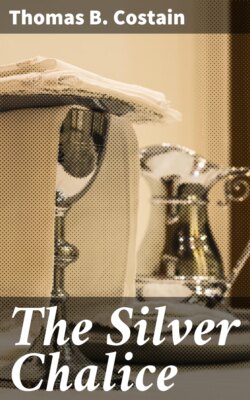Читать книгу The Silver Chalice - Thomas B. Costain - Страница 29
На сайте Литреса книга снята с продажи.
1
ОглавлениеTable of Contents
Seated at one of his windows, Basil waited the next morning for the summons from Joseph of Arimathea. From here he could look across the bridge that spanned the Cheesemakers’ Valley and ran straight as an arrow flight to the Temple. The bridge was a magnificent structure, as great in its way as the Temple itself; a span of white stone nearly four hundred feet long and wide enough to allow the passage of five chariots driving abreast. He had crossed it many times in his morning rambles and was finding that he fell naturally into the custom of keeping his eyes on the grandeur of marble and gold massed above and allowing his feet to take care of themselves. One aspect had kept him in a somewhat unhappy frame of mind, however: the squalor of the valley two hundred feet below. There was no reason, he realized, for him to carry any such burden of worry: the people of Jerusalem, even the humble workers themselves who lived in that hot and malodorous depression, seemed to give no thought to the contrast between the magnificence of the heights and the poverty of the depths. Or did they reserve their discontent for the meetings in the cellars of Fish Street that Benjie the Asker frequented?
As he watched the bridge this morning, Basil became aware of three men in particular. They had, quite apparently, visited the Temple and were now crossing back to the city. They walked abreast, and the one in the center was shorter than his two companions, a slight figure with bowed legs showing beneath his knee-length tunic. He was monopolizing the conversation, for even at that distance Basil could see the emphatic nod of his head, the frequent lift of his hand for emphasis. His fellow walkers paced along beside him in absorbed silence, their attention given to every word he uttered.
Basil’s attention, nevertheless, was given mostly to the member of the trio who walked on the right. There was a familiarity about this figure that did not lead to an identification until some peculiarity about the man’s gait solved the problem. It was Luke, a jaded and somewhat disheveled Luke, weary from his travels and walking with the suggestion of a limp. Basil got to his feet and leaned out of the window in order to see better. He was realizing how much he had missed this kindliest of men since they had parted at Aleppo.
A man crossing the bridge in the opposite direction stopped as the three passed him. He remained motionless for a few moments, his eyes fixed intently on their backs. Then he turned and began to follow. A few moments later another pedestrian did the same. Before the watcher in the window was fully aware of what was happening there were half a dozen people tramping in the wake of the small man with the bowed legs; and before the head of the procession had reached the end of the bridge there were at least twoscore. It was now possible to distinguish voices, and Basil could hear repeated one word time and again, “Paul—Paul—Paul.”
The small man, then, was the fiery evangelist whose preaching to the Gentiles had gone so far to split the Christians into two camps and whose presence in Jerusalem was expected to lead to much trouble. Basil strove to recall the day when he had heard Paul preach at Ceratium; but time, he found, had now blurred that episode in his mind.
His interest was deeply engaged and he watched the small man with the most intense curiosity. Paul, it was clear, was fully aware of the excitement he was creating and of the steady growth of the following that trailed after him like the tail of a comet. His voice could be heard, deep and resonant and emphatic. He was no longer carrying on a part in a conversation but was delivering an oration that those behind him could hear. His gestures had become studied and occasionally he shot a quick glance back over his shoulder as though to estimate the effect of what he was saying.
When the slow procession reached the end of the bridge and poured onto the paved open space before the door of Joseph it was joined by members of the household. Basil was surprised to see the diminutive figure of Benjie the Asker among the newcomers. From a window to his right he perceived the bald head of Aaron peering out with a caution that suggested he did not want to be seen himself.
Luke whispered in Paul’s ear. The latter listened intently and then nodded in agreement. Raising a hand above his head, he spoke directly to those who had followed him.
“It is not meet that we linger here before the door of a brave and good man in whose debt we stand,” he began. Basil, sitting high up in his window, could hear every word clearly, for Paul’s voice had a remarkable carrying quality. “Disperse now to your homes or to the occupations by which you earn your daily bread. There will be opportunities within the next few days for us to gather together so that ye may hear what I have to tell of my stewardship. I do not know when or where it will be. The hand of hostility is being raised against us and we must exercise caution. Go then: watch and wait for the time when it will be possible for us to meet.” The apostle paused and glanced about him at the attentive faces. “Then you will hear a wondrous story, the story of a world yearning for the truth, a field ripe for the sickle.”
